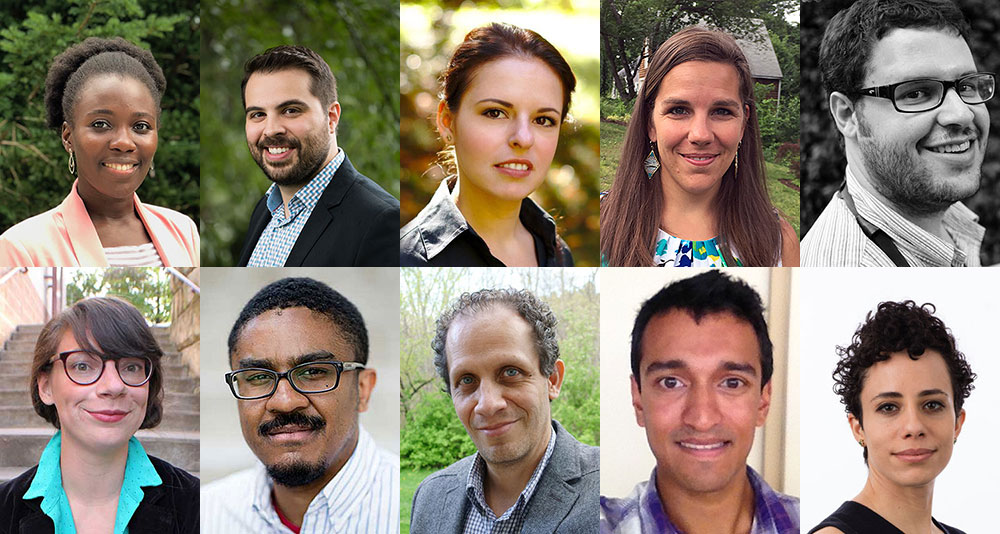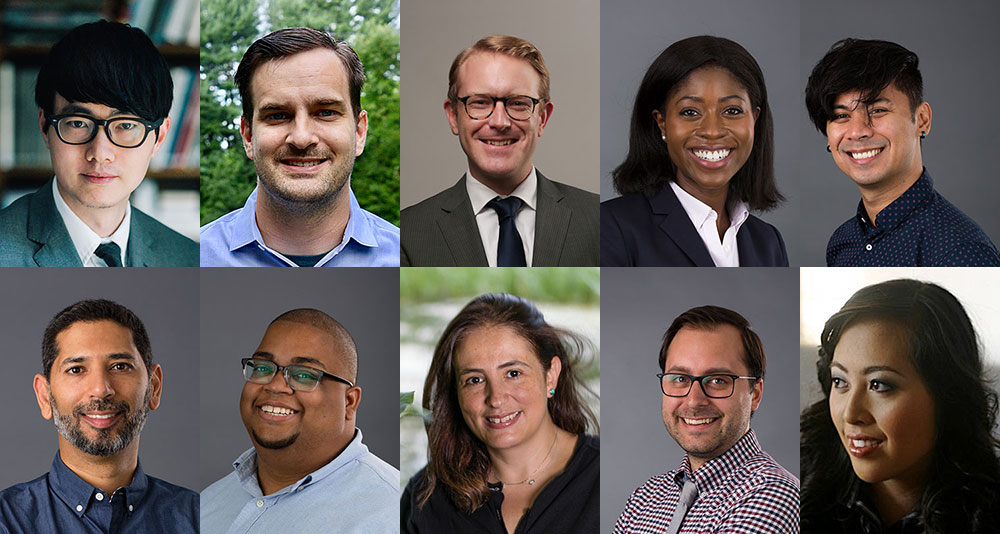Amherst is in an era of “faculty renewal”: because of retirements, an extraordinary portion of the faculty—about 36 percent—has been hired since 2011. The influx of new faculty continues this year, as the College welcomes dozens of professors, lecturers and fellows into more than 20 departments and programs. They hold degrees from institutions on five different continents, and their areas of expertise range in scale from the international, to the interpersonal, to the microscopic.
The number of students enrolling in math and science courses and majoring in STEM fields has skyrocketed, so it’s no surprise that many of the new hires are in the Department of Mathematics and Statistics. Karamatou Yacoubou Djima, Ryan Alvarado and Amalia Culiuc are all assistant professors of mathematics whose research touches upon harmonic analysis in various ways. Visiting Professor Ivan Contreras focuses on mathematical physics, especially the connections between geometry, topology and field theories, while Lecturer Yongheng Zhang is interested in algebraic topology, homotopy theory and their interactions with engineering, science and other fields of math.

(top row, l to r): Karamatou Yacoubou Djima, Ryan Alvarado, Amalia Culiuc, Katharine Correia, Matteo Riondato; (bottom row, l to r): Amy Coddington, Dwight Carey, Gabriel Arboleda, Ashwin Ravikumar, Mona Oraby
Also employing math and stats is Matteo Riondato, assistant professor of computer science. He uses tools from statistical learning theory, combinatorics, probability, graph theory and mathematical optimization to design randomized algorithms that offer guarantees on their performances or on the quality of their output.
Amherst’s music department features some additional voices. Arianne Abela, the new director of the choral music program and lecturer in music, encourages diversity, inclusiveness and community-building through the choral arts. Carl Clements, visiting lecturer in music and visiting director of jazz performance, is active internationally as a composer, scholar and woodwind player, focusing on jazz, Hindustani classical music and contemporary improvisation. Assistant Professor Amy Coddington teaches courses on American popular music and is at work on a book about the commercial radio industry’s role in making hip-hop mainstream. Yvette Janine Jackson, the Joseph E. and Grace W. Valentine Visiting Assistant Professor of Music, is a composer and sound installation artist whose research interests include radio drama as electroacoustic music, soundscape composition and spatial audio.
Jake Meginsky, visiting lecturer in theater and dance, is also a sound artist, as well as a composer and filmmaker. He produced, directed and designed the sound for the 2018 feature film Milford Graves Full Mantis, and his work as a composer has been presented at such venues as New York’s Museum of Arts and Design and the Guggenheim Museum.
Artist-in-Residence Macon Reed recently completed a fellowship at Eyebeam Art + Technology Center and a residency at the Skowhegan School of Painting and Sculpture. She designs immersive sculptural environments that serve as public sites for inter-community conversation and ritual. Another sculptor joining Amherst’s faculty is Douglas Culhane, visiting lecturer in art and the history of art.
Dwight Carey, assistant professor of the history of art, says his interdisciplinary research involves examination of the built environments of slavery from a methodological perspective that combines archival and on-site analysis, laboratory investigations of building materials and oral history. He is developing a natural resource history of Mauritian architecture.
Gabriel Arboleda, assistant professor of architectural studies, relies upon social science theory in his architectural research, teaching and practice. He is working on a monograph about sustainability in social design—particularly among impoverished rural populations in Africa, Latin America and other places.
Ashwin Ravikumar, assistant professor of environmental studies, is also interested in sustainability. He studies deforestation and land use change in the global south, especially the Amazon rainforest.

(top row, l to r): George Zhijian Qiao, Jake Blackwood, Neil White, Jakina Debnam, Sony Coráñez Bolton; (bottom row, l to r): Pawan Dhingra, Marc Edwards, Katerina Ragkousi, Christopher Durr, Arianne Abela
New to the Department of Religion, Jason O. Jeffries, postdoctoral fellow and visiting assistant professor, researches Black religions, African American culture and religion, and African American identity formation. Visiting Assistant Professor Michael Amoruso focuses on religion in the Americas, paying special attention to the ritual engagement of the dead in the United States and Brazil.
In the Department of Law, Jurisprudence and Social Thought, Assistant Professor Mona Oraby also studies religion, where it intersects with law and politics—specifically, she examines the legal regulation of religious difference. Michaela Brangan, visiting assistant professor of LJST, pays particular attention to how common law concepts operate as organizing devices in experimental and speculative literatures.
Mark R. Jacobson, the John J. McCloy ’16 Professor of American Institutions and International Diplomacy, comes to Amherst after serving as the first deputy senior civilian representative to Afghanistan for the NATO alliance, as a professional staff member at the Senate Armed Services Committee and as an adviser to the most senior Department of Defense military and civilian officials. He now researches disinformation and political warfare, as well as the intersection of community identity/validation and military service. Sebastian Bitar, Karl Loewenstein Fellow and visiting associate professor of political science, studies U.S.-Latin American relations, foreign policy and security in the Western Hemisphere.
Russell Lohse, visiting assistant professor of history, has published widely on the African Diaspora in the Americas and is now working on a book on gender, slavery and violence in colonial Honduras. Andreas Önnerfors comes to Amherst’s history department through a fellowship with Sweden’s STINT foundation. With a background in the intellectual history of the Enlightenment, he recently has specialized in the contemporary political history of ideas and right-wing radicalization.
George Zhijian Qiao, assistant professor of history and Asian languages and civilizations, is a historian of late imperial China. He is interested in interactions between economic forces, political developments, and sociocultural factors that shaped market institutions and molded the behavior of economic actors, and in how people’s economic activities and business institutions helped to change political configurations and transform sociocultural landscapes.
Speaking of economics: Amherst’s econ department welcomes three new assistant professors. Jake Blackwood’s research employs heterogeneous agent models to study how frictions and distortions affect firm outcomes and what the macroeconomic implications are, both in the long run and over the business cycle. Neil White focuses primarily on the impact of government policies on the macroeconomy, with a particular emphasis on understanding the effects of monetary and fiscal policy on the labor market. Jakina Debnam’s research projects introduce social and psychological features into existing economic frameworks and quantify the extent to which these features matter for economic outcomes and well-being.
Sarah Huff, Robert E. Keiter 1957 Postdoctoral Fellow and visiting assistant professor of psychology, explores how identities and cultural contexts influence interpersonal and intergroup relations. Kyle Smith, visiting associate professor of psychology, examines how people’s unconscious beliefs influence their estimates of the likelihood of events and evaluates how people make judgments about the sexual orientations of others.
Jessica Ann Vooris, visiting assistant professor of sexuality, women’s, and gender studies, researches LGBTQ families, children’s gender and sexuality and queer parenting. She is writing a book about transgender, gender-creative and gay children.
Assistant Professor of Spanish Sony Coráñez Bolton says their research lies at the intersection of queer studies, disability studies and race studies in the U.S.-occupied Philippines and the U.S.-Mexico borderlands.
Valentina Velázquez-Zvierkova, lecturer in Spanish, focuses her scholarship on 20th-century Mexican culture. Her current project examines the participation of transnational actors in Mexico’s Golden Age cinema.
The works of Bernadine Mellis, Five College senior lecturer in film and video production, include the documentary The Forest for the Trees and the short film I Should Think Fire.
Shayla Lawson, writer-in-residence and chair of the Creative Writing Center, is author of the recent poetry collection I Think I’m Ready to See Frank Ocean and the forthcoming essay collection Live Tonight, Ms. Diana Ross.
Pawan Dhingra, professor of American studies, is a book author, reviewer, museum curator and public speaker. His current research involves extracurricular education (such as spelling bees and math centers), parenting, immigration, race and culture.
Julia Scarborough, visiting assistant professor of classics, examines the uses of pastoral imagery in Greek and Latin poetry beyond the bucolic genre, both to create tragic irony and to reflect on the work and the social role of the poet.
Mara Bollard, visiting assistant professor of philosophy, is interested in ethical theory and empirically informed moral psychology—particularly the variety of roles that the emotions play in moral talk, thought and behavior.
Abigail Carroll, visiting assistant professor of geology, studies the rock record of Wyoming’s Bighorn Basin to investigate ancient global warming events and their impacts on early mammals and ecosystems.
In the biology department, two new assistant professors conduct research at the cellular level: Marc Edwards’ lab uses a range of cell biology and microscopy techniques to decipher the basic mechanisms of directed migration in Dictyostelium, while Katerina Ragkousi’s lab uses live sea anemone embryos (Nematostella vectensis) to study the processes that drive cell organization into polarized layers during animal development. Visiting Assistant Professor Joohyun Lee researches how environmental cues control epigenetic modifications using molecular, genetic and biochemical approaches. M. Nidanie Henderson-Stull, another visiting assistant professor, seeks to determine the structure and function of proteins involved in cancer in order to improve anti-cancer drugs.
Christopher Durr, assistant professor of chemistry, says his interdisciplinary research in inorganic chemistry is focused on developing and understanding next-generation polymeric materials, including switchable catalysts, degradable polymers and biomedical materials.
Charles Collett, visiting assistant professor of physics, focuses on experimental low-temperature physics (saying his “personal best” temperature is only 500 degrees microKelvin above absolute zero). He is working toward creating quantum computing components out of the fascinating quantum systems called molecular nanomagnets.